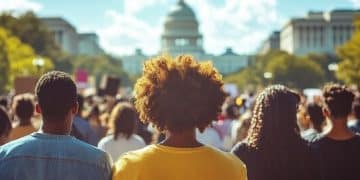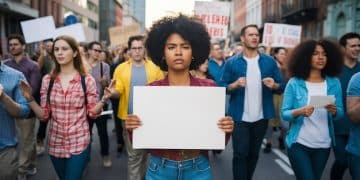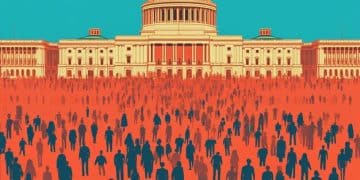Understanding the Rights of Protestors in the US: A Comprehensive Guide
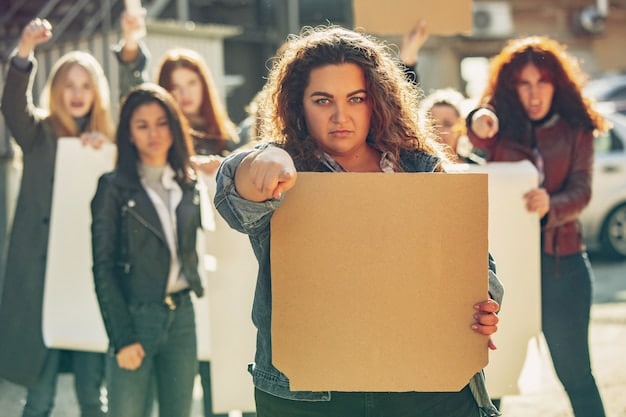
Understanding the Rights of Protestors is crucial for anyone planning to participate in demonstrations in the United States, ensuring they know their legal boundaries and how to exercise their rights safely and effectively.
Understanding the Rights of Protestors: What You Need to Know Before Taking to the Streets is essential for anyone participating in demonstrations. Knowing your rights protects you legally and ensures your voice is heard effectively.
Your First Amendment Rights: Freedom of Speech and Assembly
The First Amendment to the United States Constitution protects the rights to freedom of speech and assembly. This means you have the right to express your views and gather with others to protest or demonstrate.
These rights, however, are not absolute and are subject to certain reasonable restrictions.
Time, Place, and Manner Restrictions
The government can impose restrictions on protests based on time, place, and manner. These restrictions must be content-neutral, meaning they cannot discriminate based on the message being conveyed.
- Time: Restrictions on when protests can occur, such as curfews.
- Place: Limitations on where protests can take place, such as near courthouses or private residences.
- Manner: Rules about how protests are conducted, such as noise levels or blocking traffic.
These restrictions must be narrowly tailored to serve a significant government interest and leave open alternative channels for communication.
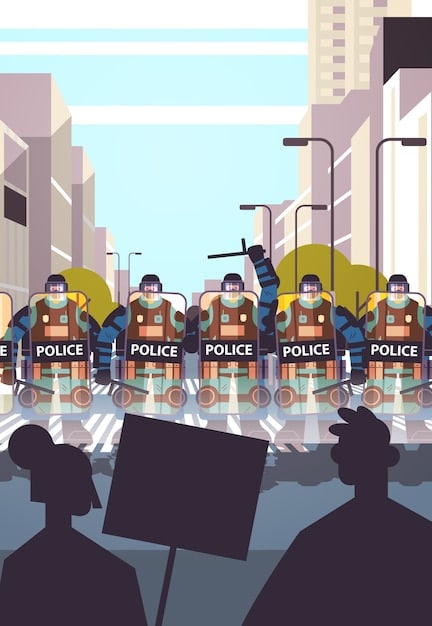
Understanding these limitations is crucial for planning and participating in lawful protests.
Permits and Regulations for Demonstrations
Many cities and towns require permits for protests, especially if they involve marches, rallies in public spaces, or the use of sound amplification equipment. Applying for a permit can help ensure your protest proceeds smoothly and legally.
It is essential to understand the local regulations of your area.
When Are Permits Required?
Permits are typically required when protests involve:
- Blocking streets or sidewalks.
- Using sound amplification devices.
- Taking place in designated public parks.
The requirements vary by location, so check with your local government for specific regulations. Failure to obtain a necessary permit can result in fines or arrest.
Remember to apply for permits well in advance of your planned protest to allow time for processing.
What to Do If You Are Arrested at a Protest
Being arrested at a protest can be a frightening experience. However, knowing your rights and how to respond can help protect you and your interests.
It is important to remain calm and assert your rights.
Your Rights During an Arrest
If you are arrested, you have the right to:
- Remain silent.
- Speak to an attorney.
- Know the charges against you.
Do not resist arrest, even if you believe it is unlawful. Instead, assert your rights and contact an attorney as soon as possible.
Avoid making statements that could be used against you in court.
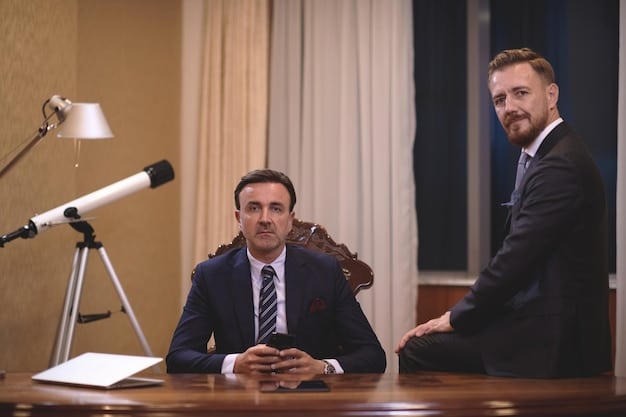
Legal Observation and Support During Protests
Organizations like the American Civil Liberties Union (ACLU) and the National Lawyers Guild provide legal observers at protests. These observers monitor police activity and document any violations of protestors’ rights.
Their presence can help deter misconduct and provide support to those who are arrested.
How Legal Observers Help
Legal observers typically:
- Wear bright colored vests to be easily identified.
- Observe and document police actions.
- Provide information and referrals to attorneys.
Having legal observers present can provide an additional layer of protection for protestors. They serve as witnesses to ensure that rights are protected and abuses are documented.
Consider contacting these organizations before a protest to inquire about legal observer support.
Understanding Protest Zones and Free Speech Zones
Some cities establish designated protest zones or free speech zones, which are specific areas where protests are allowed. These zones are often located away from the intended target of the protest, raising concerns about their effectiveness.
The legality and appropriateness of these zones have been challenged in court.
Legal Challenges to Free Speech Zones
Courts have generally held that free speech zones are permissible if they:
- Are content-neutral.
- Serve a legitimate government interest.
- Leave open alternative channels for communication.
However, if these zones are used to suppress dissent or isolate protestors, they may be deemed unconstitutional.
It is essential to be aware of the location and restrictions of any free speech zones in your area.
The Role of Social Media in Organizing and Documenting Protests
Social media platforms play a significant role in organizing protests and documenting events as they unfold. They allow activists to quickly disseminate information and mobilize supporters.
However, using social media for these purposes also carries risks.
Risks of Social Media Use During Protests
Some potential risks include:
- Surveillance by law enforcement.
- Misinformation and disinformation.
- Privacy concerns.
Be mindful of what you post online and take steps to protect your privacy. Use encrypted messaging apps and avoid sharing sensitive information on public platforms.
Remember that anything you post online can be used against you in court.
| Key Aspect | Brief Description |
|---|---|
| 📢 First Amendment | Protects freedom of speech and assembly, but with restrictions. |
| 👮 Arrest Rights | Right to remain silent, speak to an attorney, and know charges. |
| 🏛️ Permit Needs | Often required for marches, sound amplification, and public spaces. |
| 📱 Social Media | Useful for organizing, but carries surveillance and privacy risks. |
Frequently Asked Questions
Not always. Permits are typically required for protests that involve blocking streets, using amplified sound, or taking place in certain public spaces. Check local regulations.
Listen carefully to the instructions. If the order seems unlawful, you can state your intent to peacefully comply, but it’s crucial to do so without resisting or arguing.
Yes, police can search you incident to a lawful arrest. However, they need probable cause for an arrest to be lawful in the first place.
They can be, if content-neutral and provide alternate means for communication. But they shouldn’t be used to suppress or isolate protestors unfairly.
Legal observers monitor police actions, document rights violations, and can provide referrals to attorneys if needed. They are a vital form of support.
Conclusion
Understanding your rights as a protestor is critical for ensuring your safety and ability to effectively voice your opinions. By knowing the laws and regulations, you can participate responsibly and protect yourself from potential legal issues.

